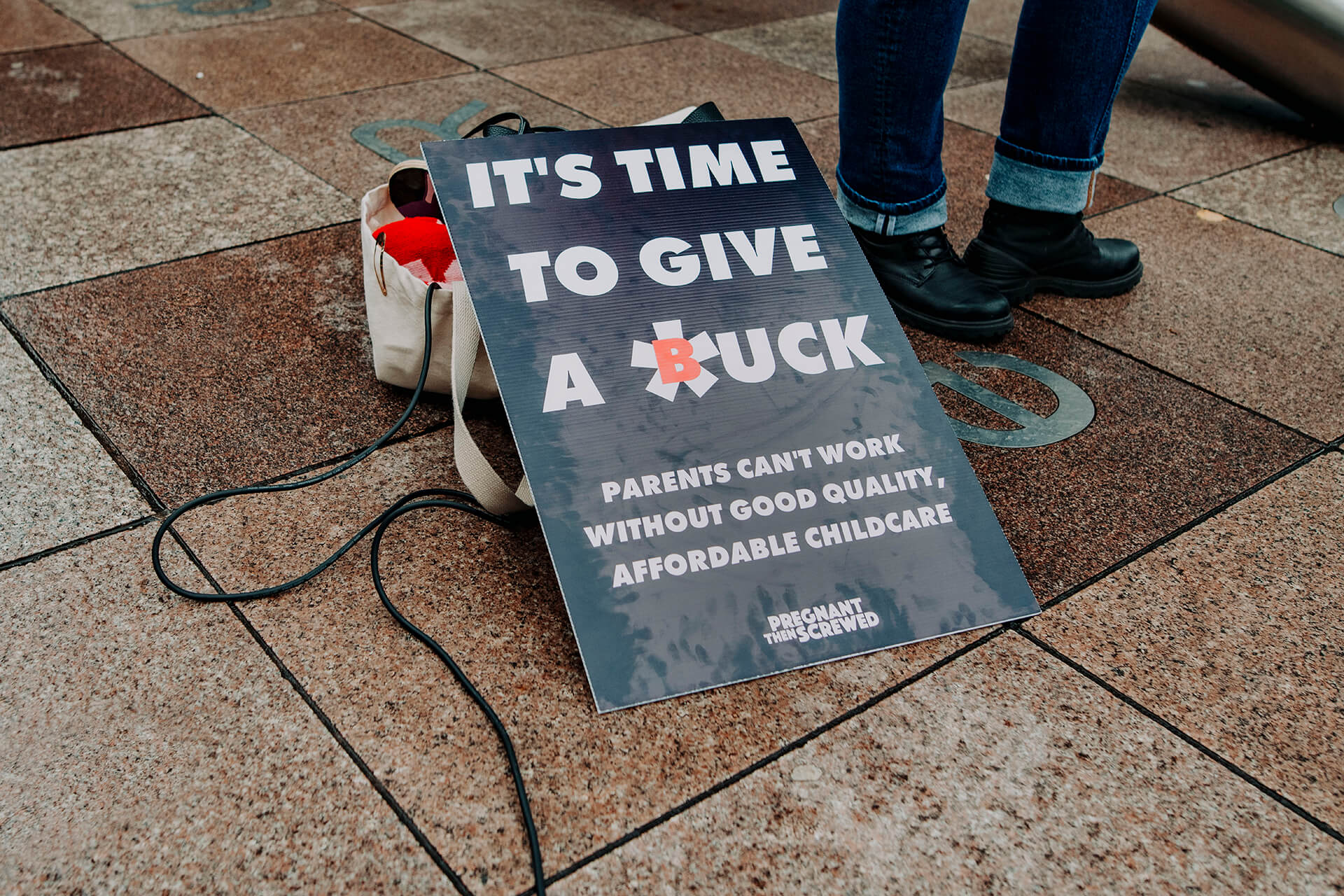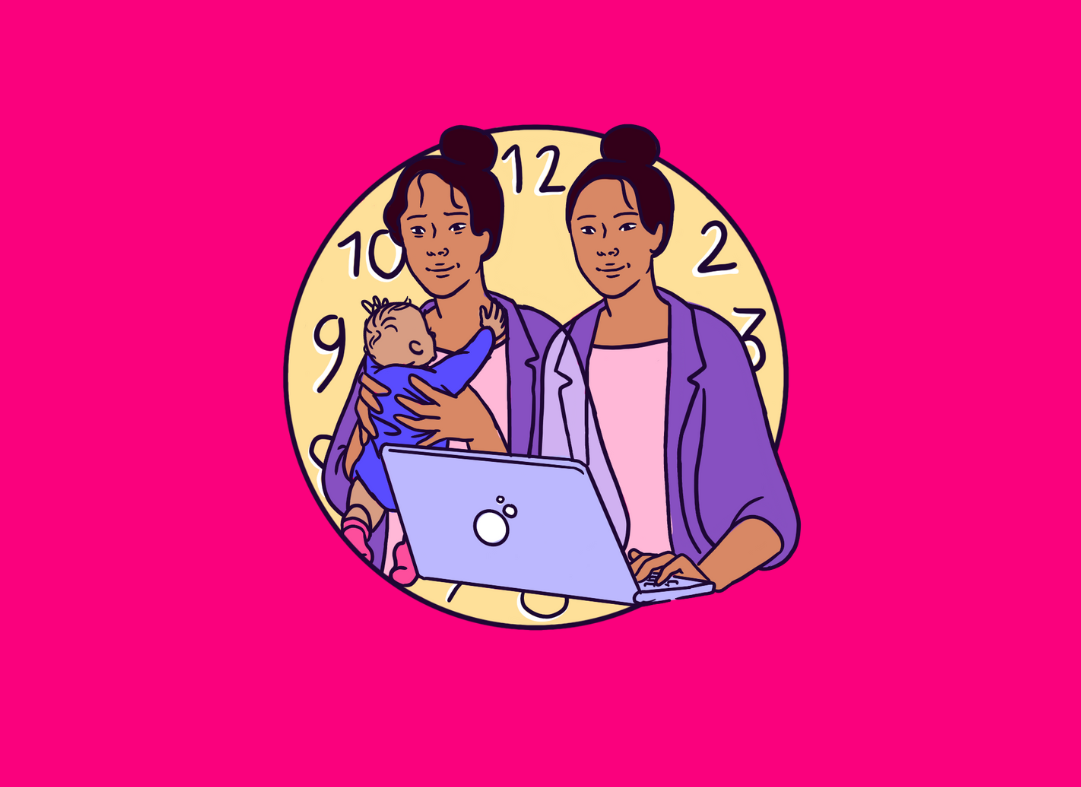Pregnant women heading for a ‘perfect storm’ warn charities and campaigners
Low vaccination rates, rising levels of the Omicron variant and a lack of health and safety protection in the workplace is creating a perfect storm for pregnant women.
New survey of 4,000 pregnant women finds worrying levels of misinformation about the vaccine in pregnancy whilst just 42% of employers are following a risks assessment for their pregnant employees, despite this being a legal obligation.
Date 15TH December 2021: Today, Pregnant Then Screwed, The Royal College of Midwives, Birthrights, the Women’s Budget Group and the Fawcett Society have written to the Secretary of State for Health to warn of more tragedies should the Government not take immediate action to prioritise pregnant women for the booster and ensure their safety at work.
Pregnant women are the only vulnerable group to have not been priorotised for the vaccine or the booster. The most recent data showed that only 22% of women who gave birth in August were vaccinated. A mere 5.5% of Black pregannt women were vaccinated. This is far below the national average of 89%. A new survey of 4,000 pregnant women finds that 90% of those who tried to access the booster before Saturday 11th December were unable to. Since Sunday 12th December, boosters can be booked by anyone over 18 years old, but many pregnant women are worried about standing in long queues at busy vaccine centres. Meanwhile, pregnant women who work outside of the home are not being protected; the survey also revealed that just 42% of pregnant women who work outside of the home say that their employer is following a risk assessment, despite this being a legal requirement. Half of pregnant women who work outside of the home feel unsafe at work; but one in five are too scared to ask for a risk assessment for fear they will lose their job. And just 6% think the Government guidance is clear when it comes to the safety of pregnant women in the workplace.
Joeli Brearley, founder of Pregnant Then Screwed said:
‘’It took the Government 9 months to issue any safety guidance for pregnant women in the workplace, this was finally released in December 2020, but it continues to fall short, leaving pregnant women without adequate workplace protection. It is imperative that the Government clearly communicate that all pregnant women must be enabled to socially distance and must be provided with full PPE, if this is not possible, then they must be suspended on full pay.’’
‘’We are currently in the position where many pregnant women are being forced to choose between their safety and their livelihood.’’
Low rates of vaccination can be attributed to confused messaging and barriers to access. 31% of pregnant women said that when they were in a vaccine centre, a health professional made them question the safety of the vaccine. While 42% of pregnant women said that a health professional has made them question the safety of the vaccine in pregnancy.
One responder to the survey said:
‘’I was told the vaccine may have adverse effects on my pregnancy and that there wasn’t enough evidence that it’s safe. I was also given out dated information packets which still stated the vaccine was not recommended for pregnant women or women who were planning on becoming pregnant in the next 3 months.’’
Many pregnant women had told Pregnant Then Screwed that whilst in the vaccine centre they felt judged by health professionals for wanting the vaccine with one in five (22%) saying they felt a health professional had questioned their decision to have the vaccine.
According to MBRRACE, 13 pregnant women died from Covid19 between July 2021 – September 2021. Research has shown that pregnant women are more likely to end up in ICU, whilst their baby is twice as likely to be stillborn.
The Royal College of Midwives (RCM) Director for Professional Midwifery, Dr Mary Ross-Davie, said:
“Because of the increased risk of COVID to women and their babies, it’s vital that pregnant women are now prioritised and encouraged to take up their vaccine and booster dose. Setting up vaccination sites close to antenatal clinics is a great way to encourage uptake, but they must be staffed by vaccinators and not take midwives away from their core work, particularly in the light of workforce shortages in maternity services. Let’s remove as many barriers as we can and make it easier for pregnant women to protect themselves and their babies.”
Joeli Brearley, founder of Pregnat Then Screwed said:
‘’Thousands of pregnant women have made every effort to protect themselves against Covid, knowing they are more likely to become seriously unwell should they become infected, but they have encountered unnecessary barriers”.
“The fact that pregnant women have neither been prioritised for the vaccine or the booster has left many without the protection they need“
Pregnant Then Screwed, the RCM, Birthrights, the Fawcett Society and the Women’s Budget Group are calling on the Government to:
-
Prevent the further spread of misinformation about the risks and benefits of the COVID-19 vaccines in pregnancy by ensuring all health professionals and those in vaccine centres are given the most up to date research and data, and they should be encouraged to have proactive conversations with pregnant women about the vaccine.
-
Include pregnant women under the age of 18 years old in those who are eligible for the booster vaccine.
-
Design and deliver a Government-led campaign to encourage pregnant women to get vaccinated.
-
Deploy vaccination teams in maternity units to ensure pregnant women can receive their vaccine and their booster vaccine at antenatal appointments. This must not be an expectation of midwives who are already under immense pressure to deliver quality care with recent data from the Royal College of Midwives showing that 84% are not happy with staffing levels and 67% are not happy with the quality of care they are able to give.
-
Consider the opportunities in every part of the system to prioritise pregnant women for the vaccine and the booster and ensure they can be prioritised at vaccine centres to reduce their waiting time. This should be communicated at a national level.
-
Enhance the Government guidance: ‘Working Safely During COVID-19’ to include a specific section on pregnant women which stipulates that they should work from home where possible, must be enabled to remain 2 meters away from others at all times (including their commute to work), and they must be equipped with appropriate PPE. If this is not possible then they must be suspended from work on full pay, in line with existing health and safety regulations.
-
Extend the furlough scheme for pregnant women until 2022 so that all employers can reclaim 80% of the cost of suspending a pregnant woman on safety grounds.
-
Ensure the HSE are collecting data on breaches of health and safety with regards to pregnant women and that they are taking enforcement action where necessary
In sum, are the findings of the new survey below:
3954 women who are currently pregnant responded to the survey. Of those:
-
94.1% are white, 2.7% are mixed race, 1.8% are Asian or Asian British, 0.8% are other ethnic group and 0.7% are Black or Black British
-
47.7% are more than 28 weeks pregnant (which is the point at which all guidance for pregnant women is to take extra precaution.)
-
26.6% said they feel very scared for their safety, while 58% said they feel somewhat scared for their safety
-
1844 of the pregnant women surveyed were leaving the house to go to work. With 49.8% saying they feel unsafe at work
-
When asked if their employer had completed a risk assessment and they were following it. Only 42.8% said yes. 74.2% of those who either didn’t have a risk assessment or had one but their employer was not following it had not raised this issue with their employer. With 22.3% of those who had not raised the issue with their employer stating that they were worried they would lose their job if they demanded a risk assessment.
-
90% of those who responded had received at least 1 dose of the vaccine
-
For almost 50%, the last dose of the vaccine was less than 3 months ago
-
22% had received two doses of the vaccine and the booster
-
74% had received two doses of the vaccine, and of those 24% had attempted to get the booster vaccine. Of those 85.9% were unsuccessful.
-
31.4% said that when they were in a vaccine centre, a health professional said something that made them question whether the vaccine was safe for pregnant women.
-
21.5% said that when they were in a vaccine center a health professional questioned their decision to have the vaccine
-
41.9% said that a health professional has made them question the safety of the vaccine
-ENDS-
Notes to Editor:
About Pregnant Then Screwed (www.pregnantthenscrewed.com) is a charity which aims to end the Motherhood Penalty. we protect, support and promote the rights of mothers who suffer the effects of systemic, cultural, and institutional discrimination through our various schemes and activities, including: A free legal advice service, lobbying the Government for legislative change, and a mentor scheme that supports women who are considering legal action against their employer.



